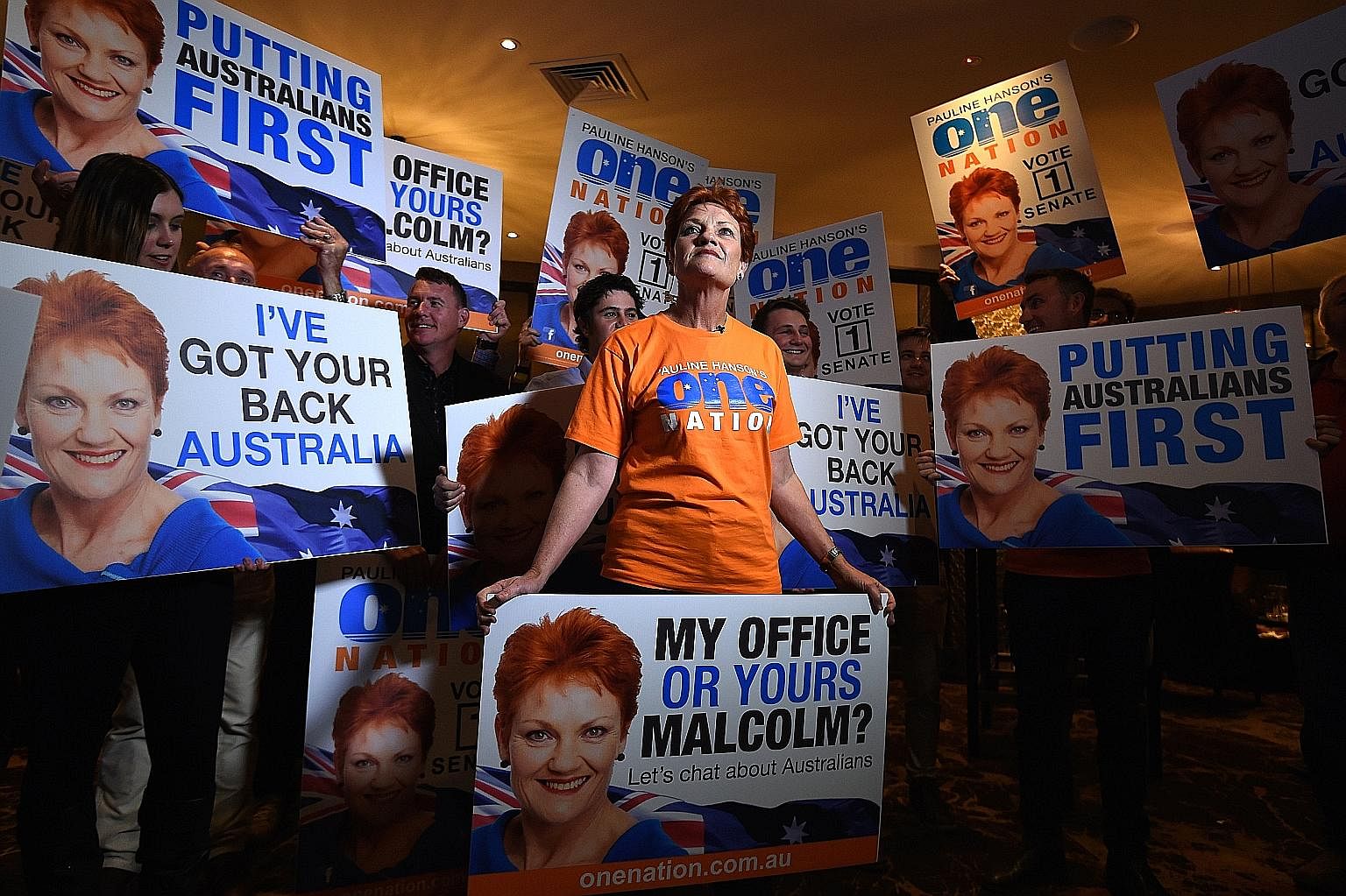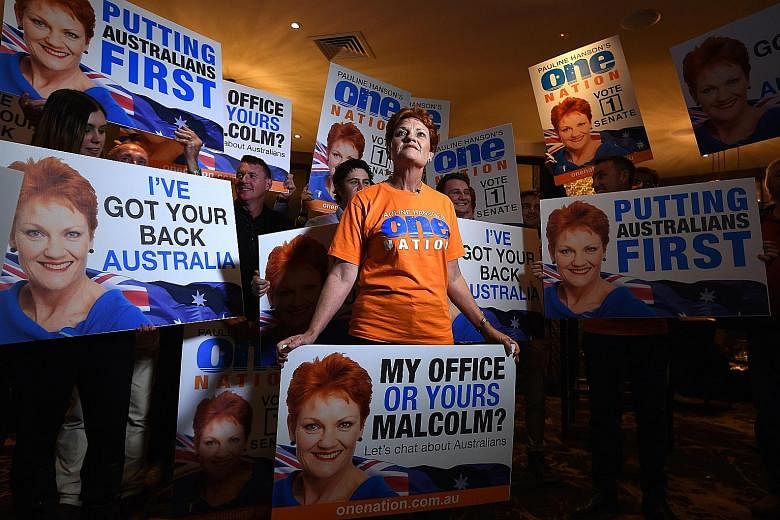SYDNEY • The return of the 1990s firebrand anti-immigration politician Pauline Hanson to the federal Parliament after a 20-year absence has triggered discussion in the media of racism surfacing again in Australian politics.
But a more intelligent analysis of the election results would show that the impressive showing of her One Nation Party has more to do with socio-economic issues and average white Australians' disillusionment with mainstream political parties.
With final results still to be confirmed, Ms Hanson may be joined in the Australian Senate by one or even two other members of her party and another one as an MP in the Lower House, where she served for two years in the 1990s. In the Senate, Ms Hanson's party outpolled the "Third Force" in Australian politics, the Greens, by 9.15 per cent to 7.57 per cent.
The sentiments of voters at the July 2 election, especially the white urban working-class as well as rural farmers, are no different to those of Filipinos who elected President Rodgrigo Duterte, Americans who have propelled Mr Donald Trump to the Republican Party presidential nomination or British voters who opted for Brexit.
They all no longer trust the established parties and political elites.
"Positions of public office are positions of public trust - but the public no longer sufficiently trusts either the coalition or Labor to confer on them a significant majority," The Age newspaper noted, reflecting on the dramatic drop in voter support for Australia's two major parties, Liberal-National coalition and Labor.

When Ms Hanson first arrived in Canberra as a Lower House MP from Queensland in 1996, she rocked the political establishment with her maiden speech opposing Asian immigration and welfare benefits for Aborigines. She echoed the days of the "White Australia" policy, when politicians warned of the "Yellow Peril".
After initially treating Ms Hanson with kid gloves, the two major parties constructed preference deals to block her re-entry to Parliament in 1998 and kept her at bay for 18 more years. Ms Hanson kept fighting.
Though One Nation triumphed at the Queensland state election, winning 11 seats, internal feuding and incompetence began unravelling her party federally. She lost control of the party, fell out with key supporters, went to jail for nearly three months in 2003 for electoral fraud before being exonerated and freed on appeal. Upon her release, she set up a new party, and ultimately reclaimed One Nation.
Her battles with the political establishment and her determination to win may have garnered her both sympathy and support among the wider Australian community. Now she is on the brink of becoming a major force in national politics.
In a post-election interview, Ms Hanson told the Australian Broadcasting Corporation (ABC): "I am not going to back down in what I believe and what a lot of Australians feel and believe as well." She also said the people are fed up with seeing a dysfunctional Parliament and that the antics that go on are not what the people want or need.
Attorney-General George Brandis has called for Ms Hanson's views to be treated with respect. "Pauline Hanson represents a view that has been endorsed by hundreds of thousands of Australian electors and she is entitled to be listened to," he told ABC Radio. "If only so that we can debate her points of view and those of us who disagree with them can explain why we disagree."
If one were to examine closely the One Nation platform, it reflects issues that many people in Australia are concerned about but major parties, and even the mainstream media, shy away from discussing.
The One Nation platform raises issues such as increasing home values that have made housing unaffordable for young Australians, and calls for restrictions on foreign investments in the sector; it has described the halal certification system as a financial scandal where Australian shoppers are paying a tax surcharge to fund Islamic schools and mosques, and asks for this system to be investigated; it has called for the Agenda 21 agreement Australia signed in 1992 to be repealed because it tries to control people's lifestyle and privatise water; it opposes a carbon tax because it puts an extra burden on struggling families; and it has called for a review of the aged pension criteria so rural farmers and the poor will not be forced out of their homes.
Though her maiden speech in Parliament in 1996 referred to Australia being "swarmed by Asians", she hasn't repeated that in those terms, yet her party's call for a ban on foreign investments in the housing sector reflects a similar sentiment, as the Australian property market has been "swarmed" by Asian money that has jacked up housing prices.
Tapping into widespread community fears about terrorism, she has called for a review of Muslim migration and a ban on refugees, restrictions on building of mosques and an inquiry into halal certification. All of which lead to accusations that she is raising xenophobia again but this time against Muslims.
Speaking on the same radio programme, a spokesman for the Islamic Council of Queensland, Mr Ali Qadry, argued that what Ms Hanson is doing is no different to "those Muslim extremists who try to divide the community" by spreading "divisive hatred". Queensland's Griffith University political lecturer Paul Williams calls it a "a perfect storm" reflecting dissatisfaction with major parties.
Speaking to the Sydney Morning Herald, Dr Williams stressed that One Nation voters were not simply a pack of racists and Islamophobes. If anything, she had "tried to reform her image and move it away from race", making it less of an issue than she did back in 1996. He pointed out that anti-Islam parties such as the Australian Liberty Alliance did not perform well. "Most of her vote comes from people who just think mainstream politicians are all a bunch of crooks and aren't listening, and Hanson is 'one of us'," he said.
Australia's Race Discrimination Commissioner Tim Soutphommasane, a son of Chinese and Lao parents, has argued that free speech should not be about giving a passport to hate speech, that Ms Hanson's political views are repugnant and that elements of the media have helped to boost her popularity.
But he wondered if the rise of anti-establishment parties such as One Nation is because political parties can't connect with people's lived experience in ways they should. "When they talk about productivity, it's music to the ears of economists and those in the Canberra (Australia's capital) bubble, but it's anathema to most" people, he noted. "There's structural disconnect. It's jargon."
•Kalinga Seneviratne, a former radio and broadcast journalist in Australia, now teaches in Thailand.

